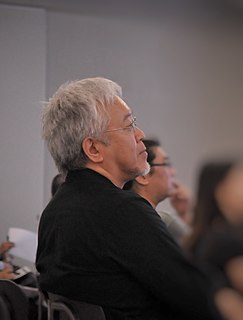A Quote by Kenya Hara
Creativity is to discover a question that has never been asked. If one brings up an idiosyncratic question, the answer he gives will necessarily be unique as well.
Related Quotes
Wes Clark is a man of whom you can ask a question, and he will look you directly in the eye, and give you the most truthful and complete answer you can imagine. You will know the absolute truth of the statement as well as the thought process behind the answer. You will have no doubt as to the intellect of the speaker and meaning of the answer to this question....So you can see, as a politician, he has a lot to learn.
And I vaguely remember her smiling at me from the door way the glittering ambiguity of a girls smile, which seems to promise an answer to the question, but never gives it. The question, the one we’ve all been asking since girls stopped being gross, the question that is to simple to be uncomplicated: Does she like me or does she LIKE me?
A dialogue is very important. It is a form of communication in which question and answer continue till a question is left without an answer. Thus the question is suspended between the two persons involved in this answer and question. It is like a bud with untouched blossoms . . . If the question is left totally untouched by thought, it then has its own answer because the questioner and answerer, as persons, have disappeared. This is a form of dialogue in which investigation reaches a certain point of intensity and depth, which then has a quality that thought can never reach.
To be a scientist you have to be willing to live with uncertainty for a long time. Research scientists begin with a question and they take a decade or two to find an answer. Then the answer they get may not even answer the question they thought it would. You have to have a supple enough mind to be open to the possibility that the answer sometimes precedes the question itself.
































